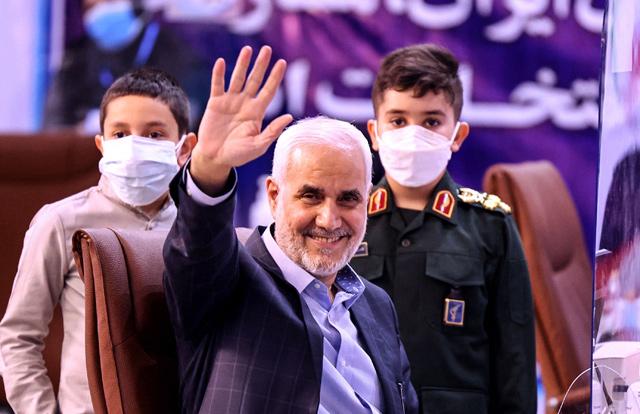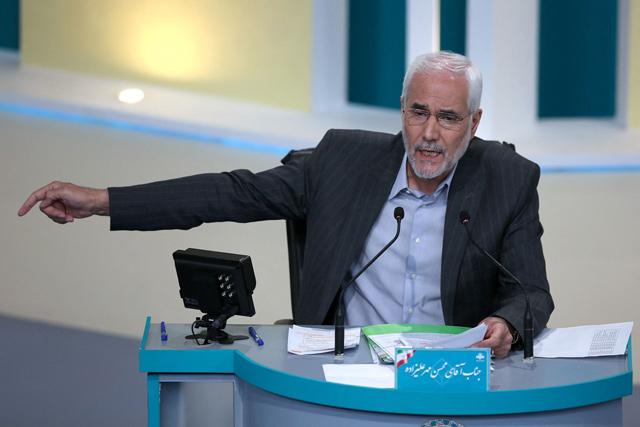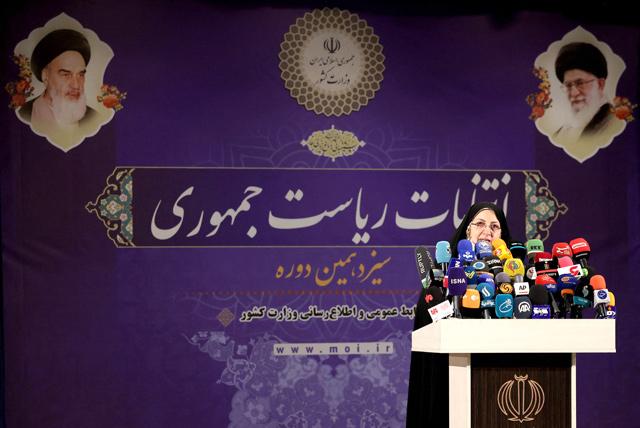You are here
Ultra-conservatives dominate Iran presidential hopefuls
By AFP - May 25,2021 - Last updated at May 25,2021

In this file photo taken on May 13, former Iranian vice president Mohsen Mehralizadeh, accompanied by his grandsons, salutes supporters as he registers his candidacy at the interior ministry in the capital Tehran, for the Islamic Republic’s upcoming presidential elections (AFP photo)
TEHRAN — Iran on Tuesday approved seven hopefuls to run in next month’s presidential poll, a list dominated by ultraconservatives and deemed “indefensible” by one senior official.
The election-vetting Guardian Council disqualified moderate conservative Ali Larijani, in a surprise move that could clear the way for a strong run by ultraconservative judiciary chief Ebrahim Raisi in the June 18 election.
The announcement comes with Iran engaged in talks with world powers aimed at reviving a nuclear deal that has been on life support since former US president Donald Trump’s unilateral withdrawal from it in 2018.
Raisi won 38 per cent of the vote in the 2017 presidential election but was defeated by Hassan Rouhani, a moderate who is constitutionally barred from holding office for three consecutive terms.
“I have never found the council’s decisions to be so indefensible, whether in approvals or disqualifications,” said Ayatollah Sadegh Amoli Larijani, a former judiciary chief, current member of the 12-man body and brother to Ali.
The cleric took to Twitter to accuse “security bodies” of increasingly influencing the vetting body through “false reports”.
The remarks by Amoli Larijani, also a member of the Assembly of Experts and the head of the powerful Expediency Council, who was replaced by Raisi at the helm of the judiciary in 2019, amount to rare criticism from a high-ranking establishment figure.
The Guardian Council also barred firebrand former president Mahmoud Ahmadinejad, as it did when he registered to be a candidate in 2017.
Ahmadinejad has yet to comment on his disqualification.
He had said before that if not approved, he would “not participate” in the election, either by backing a candidate or voting.
The list announced by the interior ministry sparked criticism from reformists and even conservatives.
“I have never seen the Guardian Council criticised and blasted so much from the far right to the far left,” said reformist journalist Mostafa Faghihi on Twitter.
‘Threat’ to competition
The press had widely predicted a showdown between Raisi and Larijani, who is currently an adviser to supreme leader Ayatollah Ali Khamenei.
Reformists had pinned their hopes on Eshaq Jahangiri, first-vice president to incumbent Rouhani, but he was also barred.
Jahangiri said the disqualifications posed “a serious threat to public participation and fair competition”, especially for reformists.
Kian Abdollahi, editor-in-chief of ultraconservative Tasnim news agency, said the council’s decision was not “justifiable to the public” and that “a major part” of conservatives opposed it.
A record 57 per cent of Iranians stayed away from legislative elections in February last year in which thousands of candidates, many of them moderates and reformists, were disqualified.
Turnout is still a concern this year, with officials including the supreme leader urging Iranians to vote.
The Guardian Council’s decision was criticised by members of the public.
The move turned the election into a mere formality, said an engineer in Tehran who only identified himself as Majid.
“It used to be disguised, but it’s not even disguised anymore,” he told AFP.
“For me, it doesn’t really matter who’s going to be [president], because whoever it is, nothing will change,” said fitness instructor Farnoosh.
The government deflected reports that Rouhani had called on Khamenei to intervene by bringing some candidates back in.
“I don’t have the latest information,” its spokesman said.
The leader had in 2005 reversed the council’s decision to bar two reformist figures, Mostafa Moein and Mohsen Mehralizadeh, with the latter an approved candidate this year.
‘God’s will’
The final list announcement comes as global powers meet in Vienna in efforts to bring Washington back into a deal over Iran’s nuclear programme, which the US left in 2018.
The withdrawal under Trump and reimposition of US sanctions led to Iran stepping up its nuclear activities.
Larijani, who was a key domestic backer of the 2015 deal, conceded his disqualification on Tuesday.
“Dear nation of Iran; now that the election was decided to be so, I have fulfilled my duty,” he wrote on Twitter.
“I am content with God’s will,” he wrote.
Many political figures and analysts said there was hardly a competition any more, as the disqualification of Raisi’s main rivals should allow him an easy victory.
They include ex-Revolutionary Guard chief Major General Mohsen Rezai, ultraconservative former nuclear negotiator Saeed Jalili, and ultraconservative MPs Alireza Zakani and Amirhossein Ghazizadeh-Hashemi.
The list also includes reformist ex-vice president Mehralizadeh, and central bank governor Abdolnasser Hemmati, deemed close to the left.
Related Articles
TEHRAN — Iran’s ex-parliament speaker Ali Larijani on Saturday demanded an explanation of why he was barred from running in next week’s pres
TEHRAN — Two Iranian political heavyweights, ultra-conservative Ebrahim Raisi and moderate conservative Ali Larijani, on Saturday launched w
TEHRAN — Iranian newspapers voiced concern Sunday about the potential turnout for next month's presidential poll, a day after candidate regi













